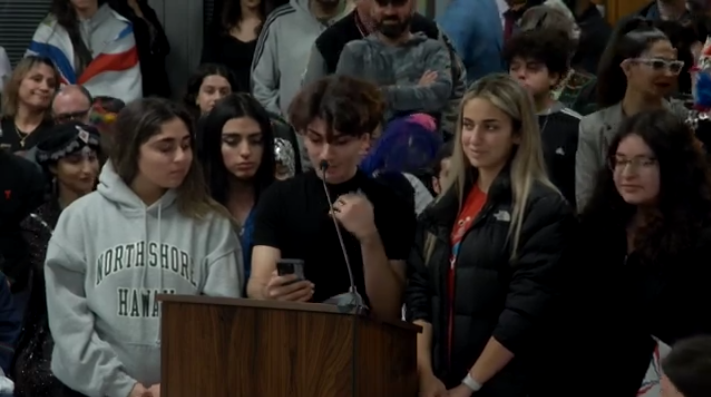D219 Board of Education Approves Assyrian Language Course
Senior and president of Assyrian club, Gabriel Daoud, advocates for Assyrian language course. He addressed the board at their regularly-scheduled meeting on Nov. 1.
Nov 3, 2022
In a unanimous decision, the District 219 School Board approved a proposal to add Assyrian to the world language course offerings, making the district the first public school system in the United States to offer Assyrian. The new course will fulfill World Language requirements for graduation and college admissions, and students will be able to enroll in the course starting in fall of 2023.
“Because Niles West has such a large Assyrian population, I feel as though this will help maintain our culture and educate the next generation of Assyrian-American students at West. This decision brings with it a positive historical impact on the already underrepresented Assyrian community,” senior and president of Assyrian Club Gabriel Daoud said, who spoke at the board meeting.
District 219 is home to one of the largest Assyrian-American populations in the country. The decision was met with support from other diaspora communities at Niles West.
“The Middle East is very diverse, but the majority of people assume we are all Muslim-Arabs, so it is very refreshing to see other Middle Eastern [students] get the spotlight on them for once,” senior and president of Middle Eastern Club Mustafa Al-Diraji said.
District 219 currently offers Chinese, French, German, Hebrew, and Spanish. Over 90 languages are spoken among Niles West students, and the question of how to equitably choose which languages to offer has been up for debate with the proposal.
“Typically when we talk about teaching a language, we talk about opening up culture, opening up a different way of thinking about how you communicate, the economic impact of that, the political, strategic, military impact of learning the languages, as well as just connections to what people are doing,” Director of World Languages for District 219 Todd Bowen said.
Early discussions involved weighing the purposes of learning world languages in high school.
“I like the idea of students being able to explore the language of their culture. Ideally, you’d want to have Tagalog offered for the Filipino students, Polish for the Polish students, Hebrew for the Jewish students, and Arabic for those students as well, but I don’t know how realistic that is,” David Malatesta, a French and Spanish teacher at Niles West, said. “Assyrian isn’t one of the languages of the United Nations. It’s a smaller population of people. I like the idea of students studying it to explore their own culture, but at the expense of studying another language that may be practical when they’re looking for a job or when they’re looking to travel internationally, Assyrian may not be the most useful in that context. However, that brings up the question: is language to be practical and to get a job and to travel, or is studying a language to explore your culture, your identity, and your history? Ideally, you’d like to have them both,” Malatesta said.
One possible concern with this addition is how much interest there will be in Assyrian and whether that will affect enrollment in other language courses.
“We don’t know how many students will be interested. We’re hoping to continue to support the languages fully and keep all given languages that we’ve been teaching vibrant and exciting,” Bowen said.
“I don’t think it will have any significant impact on the other languages, but it will allow some students to have access to a second language that they didn’t have access to before,” Malatesta said.
The College Board offers AP French, German, Italian, Spanish Language, and Spanish Literature exams. Of those course options, Niles West offers all except Italian.
“There wouldn’t be an AP option for [Assyrian]. What we’ve done with the Hebrew courses is there’s Hebrew one through four and a course called Advanced Topics that is weighted as if it were an AP course but it’s not. And in that particular Advanced Topics fourth-year honors and advanced Hebrew, students can get dual credit at Loyola so we might explore some sort of a partnership there with a university that teaches Assyrian. At some point, we may consider having a heritage version [like we do] in Spanish, but we wanted to start as a course that’s open to everybody,” Bowen said.
Now that the course is approved, it is up to Bowen to staff the course. For other content areas, from world languages to math to social studies, teachers must pass specific content area exams to gain licensure in a particular subject. Since there is not an official Assyrian exam for high school certification, the world language department will work to find qualified teachers using the same criteria as it would for other world language teachers.
“We have already done some preliminary work. A team of advocates for Assyrians who work in the district along with a world language teacher sat and began to develop preliminary units,” Bowen said. “Then we’ll go back and do some additional work and revision on those once we have staff in place so that the teachers who would be teaching it would be writing that curriculum.”
Within the past few years, District 219 has diversified its staff, gaining Assyrian staff members who take an active role in advocating for the Assyrian community and supporting students.
“I think it’s a wonderful moment not only for the Assyrian community here and more broadly the District 219 community, but really for Assyrians across the United States and around the world who are filled with hope and are motivated now,” Reine Hanna, the Niles West Literacy Center assistant, said. “Hopefully, we’ll see this cause a ripple effect and that this will be an option for Assyrians and other students in other states.” Hanna also spoke at the board meeting.
Rita Shamo, an academic advocate and co-sponsor of Assyrian Club at West, also expressed support for the Board’s decision.
“Students will have the space to explore, develop, and strengthen their cultural identities. The district is known for its diversity and this decision made by the board of education will create a stronger sense of community,” Shamo said. “The course will give opportunities for students of all cultural backgrounds to discover and learn new perspectives. I am proud to be a part of a team that fought to keep our culture alive.”
Work on the proposal started in 2015. Any change to the district’s curriculum must first pass the Curriculum Standards for School Improvement Committee (CSSI), which is comprised of teachers, administrators, and community stakeholders. A version of the course was offered in summer school in 2017 and continued for three years, continuing virtually after 2020; however, many Assyrian parents advocated for the course to be taught during the school year.
A full-time curriculum was proposed to CSSI in 2021 which was met with a favorable response. After the inclusion of twelve new Assyrian language courses in the Illinois State Course Catalog, the Illinois State Board of Education is now the first in the country to recognize Assyrian as a World Language.





Michael Graham • Nov 3, 2022 at 12:49 PM
This story is very well done — thorough, fair, and balanced, just as all good journalism should be. You also made a complex story easy to understand, a hallmark of strong writing.
Sophia Lannoye • Nov 4, 2022 at 8:58 AM
Thank you so much!